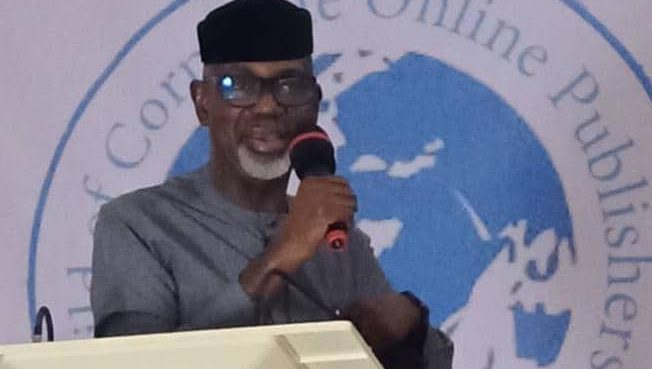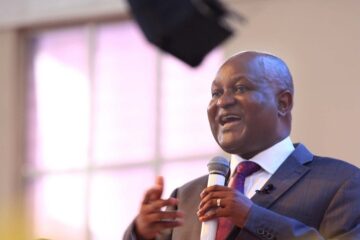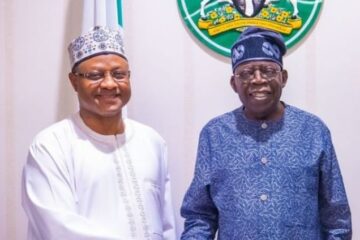GOCOP AGC: How $16b ‘expenditure’ delayed Nigeria’s power sector reforms — Liyel Imoke

Imoke, who was the Keynote Speaker at the event in Lokoja, the Kogi State capital, said there was nothing like spending $16 billion on the power sector then.
The Chairman of the Power Sector Technical Board during the Obasanjo administration, during the 8th GOCP AGC, with the theme: “Nigeria: Tackling insecurity, power deficit, and transitioning to digital economy,” admitted that the defunct National Electric Power Authority was a monopoly, adding that electricity distribution was also a monopoly even as the execution of so many programmes faced various challenges.
He referred to the undue delay in the implementation of the power sector reforms, which resulted from the probe of the claim of a phantom expenditure of $16 billion on the sector under the administration.
According to him: “The power sector probe took about two years.”
“The delay led to huge cost overruns, doubling costs of various contracts awarded during my tenure.
“Several of these projects were delayed in completion.
“As we speak, we still have several IPP projects that are ongoing.”
Imoke said that at the end of the probe, they found out that there was no missing $16 billion.
He lamented that the alleged expenditure of the phantom $16 billion was used as a political tool to criticise “those of us in government”.
The former governor fingered inadequate information as the trigger for the allegation, pointing out that, for instance, on his watch as Minister of Power, the actual spending was between $2 billion and $3 billion, much of which went to the original electric manufacturer.
The former minister said insecurity, power deficit, and the slowness in Nigeria’s transition to a full digital economy were challenges impeding national growth and development.
Imoke added, “These are challenges that impede our growth as a nation.
“They make us less globally competitive.
“If you look at electricity insecurity and the digital economy and if we tackle these, we will be on our way to economic growth.”
He said to unlock Nigeria’s potential, the administration must tackle insecurity, noting that there had been insurgency and the emergence of Boko Haram, which split into the Islamic State for West Africa Province.
Imoke said, “We have experienced banditry, kidnapping, armed killings, mass kidnapping, and illegal mining.
“These days, we can’t go to a gathering of this magnitude without seeing someone who had been kidnapped before.
“This is one of our new realities.”
He implicated ethnic tension as a contributory cause of communal violence, adding that grievances in the Niger Delta caused a lot of insecurity in the region in the 2000s.
Imoke spoke about organised private crimes in the Gulf of Guinea, which created insecurity in the area and the separatist marginalisation in the South East region, leading to agitation.
He stated that, for instance, between 2009 and 2020, insurgency by Boko Haram alone resulted in over 40,000 deaths.
He listed poverty, high unemployment rate, which was in 1999 put at six percent, in 2022 put at 22 percent, but which as at today is approaching 40 percent, weak governance and corruption as well as climate change as some of the factors that contributed or fuelled insecurity in the country.
He also listed proliferation of small arms and violent crimes across the country as a sore thumb, lamenting that there were more arms with some non-state actors put in their hands by desperate politicians and which at the end of elections, were not retrieved from them and on which they now depended to survive.
Saying hope was not lost, Imoke declared that successive administrations had succeeded in degrading Boko Haram and recovering territories in the North East hitherto seized by the group.
“The military was able to degrade the group and reclaim the areas in the Northeast around Maiduguri,” he added.
He listed other successes as the decrease in Boko Haram insurgency and deaths by 23 percent, according to the global terrorism index.
Imoke added, “There is also reduction of militancy in the Niger Delta as there is no more MEND in the region.
“Oil production has significantly rebounded until recently because during the era of MEND (Movement for the Emancipation of the Niger Delta), oil production dropped below 1.5 million barrels per day.
“There is anti-piracy measure launched through NIMASA and international collaborators to reduce the piracy in the Gulf of Guinea.
“Piracy decreased by 58 percent between 2020 and 2021 in the Gulf of Guinea.
“In the South East, the arrest of Nnamdi Kanu is an achievement in the region….
“The Nigerian government has increased its surveillance measures; its counter insurgency operation has been used in combating terrorism.
“We now have drone technology and others to attack security issues across the board.
“The persistent Boko Haram issue has been watered down, but there is a humanitarian issue.
“About 2.7 million people have been affected.
“The UN said that 350,000 people have died as a result of insurgency.”
Imoke, however, noted that herder-farmers’ conflict was still ongoing, pointing out that over 2,600 people were reportedly killed in 2021 alone.
The former Cross River State governor said continued separatist agitation had led to the death of police officers as well as members of the Indigenous People of Biafra, adding that there had been extrajudicial killings and arbitrary arrests, among others.
He said a multifaceted approach was required to effectively tackle security issues in Nigeria, recommending, among others, community policing, which should be legally regulated, deployment of vigilance groups in securing the communities, and giving consideration to decentralisation of security rather than centralisation that has not worked.
He also established a nexus between security and economy, arguing, “Until we can address the state of our economy, we will not be able to address security issues effectively.”
He stated that education skill acquisition, entrepreneurship training, and access to SMES funding were key, adding that a strong and comprehensive rural development programme was necessary to address banditry and farmer-herder conflicts.
“I am a strong believer in peace and mediation. If the government can establish dialogue platforms between farmers and herders, it would reduce competition over land,” he said.
.TheEagleOnline











